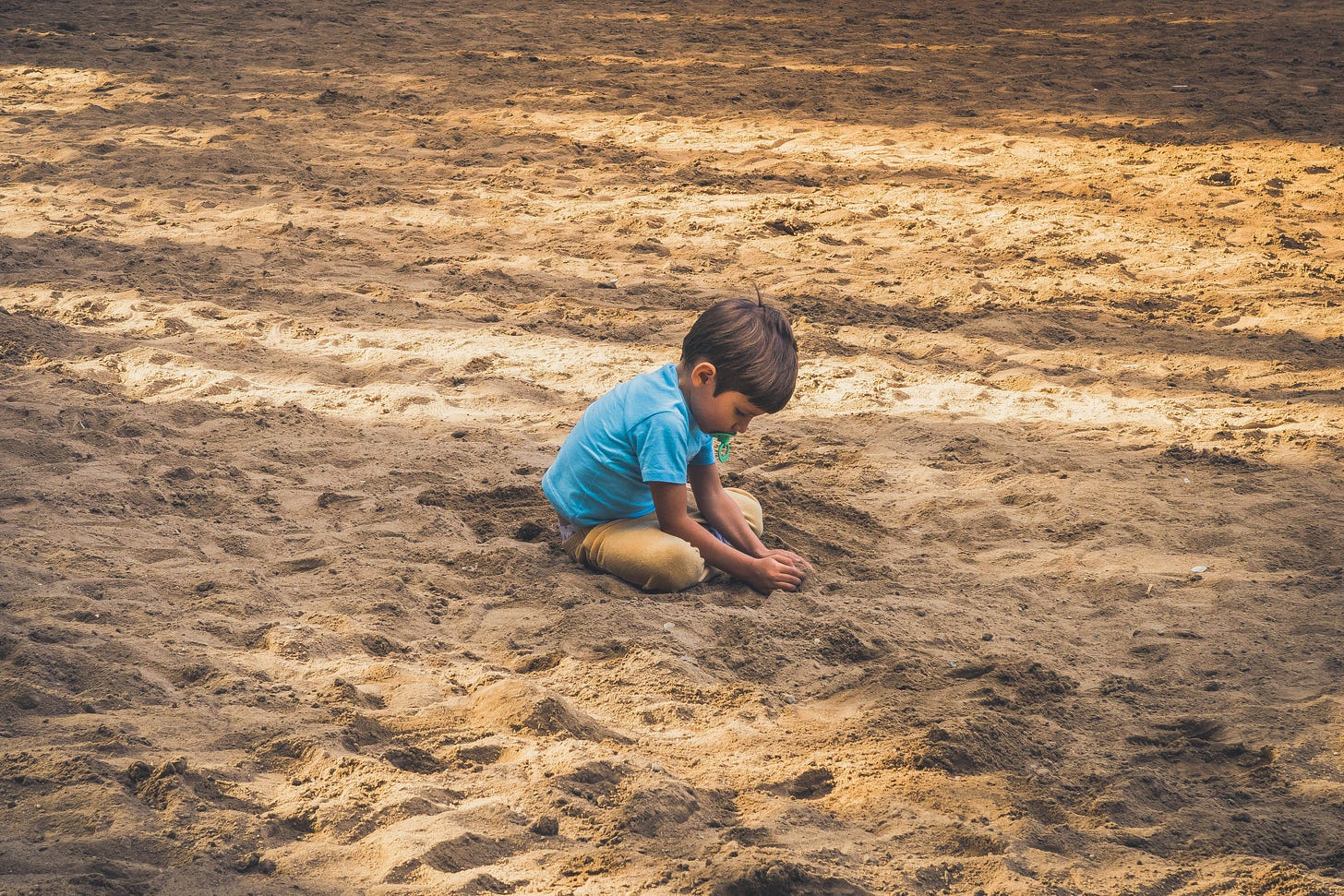The Symptom of Codependency We Never Talk About (Yes, there are symptoms.)
It's Everywhere We Look
If you’re like me, you may have chosen to pursue a romantic interest, or remain in a love relationship, despite a non-stop parade of red flags you had to ignore in order to do so. If not, maybe you’ve treated a brother or sister like the sibling you wish they would be, rather than the one they are, and positioned yourself to be hurt by them repeatedly. I’ve done that, too. If neither of these apply, I’m sure you know someone who goes through life pretending they are never wrong about anything. You’ve certainly seen someone like that on TV.
These are all examples of behaviors that fall under the umbrella of a symptom of codependency we never hear about. It relates to how, or, more precisely, whether we experience reality.

*Something as simple as clicking the like button at the end of a post, or leaving a brief comment, goes a long way toward helping new readers find this work. If you read this, and you appreciate it, please like it.
A decade ago, I suffered a painful breakup. Having been an addiction counselor for many years at that point, I knew about the concept of codependency, and that it probably applied to me. But, in a conversation with a friend and mentor, I came to realize how little I understood about it.
He mentioned five core symptoms and urged me to read the book “Facing Codependence,” by Pia Mellody. Mellody, who favors the word “codependence” over the more often used “codependency,” is a Senior Fellow at the Meadows, in Wickenburg, Arizona, and the author of several other books on this and related subject matter.
Having worked in the helping profession for 20 years by then, I heard professionals label more people codependent than I could count. They used the word interchangeably with nouns like people-pleaser, and enabler, as well as adjectives like needy, and insecure. But, never in those two decades did I ever hear a mental health practitioner of any kind mention five core symptoms.
I picked up a copy of Mellody’s book that evening and read it in about 48 hours. “Facing Codependence: What It Is, Where It Comes From, How It Sabotages Our Lives” changed my life. In addition to the core symptoms, it introduced me to the concept of intergenerational trauma. It helped me understand myself better than ever before. I began to see my family, my community, and society at large, through an entirely different lens.
Pia Mellody’s Five Core Symptoms of Codependence
Codependents have difficulty . . . 1. Experiencing appropriate levels of self-esteem 2. Setting functional boundaries 3. Owning and expressing their own reality 4. Taking care of their adult needs and wants 5. Experiencing and expressing their reality moderately
Three of the five symptoms relate to ideas I already associated with codependency – self-esteem, boundaries, attending to one’s own wants and needs. The other two I did not. One is difficulty owning and expressing one’s own reality. The other is difficulty experiencing and expressing their reality moderately.
The latter seemed clear to me. It’s what I describe as black-and-white thinking.
You hurt my feelings, so I’ll never speak to you again.
I was rejected, so no one sees me as an attractive partner.
I was fired, so I must not be employable.
And, here’s an ugly one that’s shows up in far too many relationships.
If you won’t have sex with me tonight, you must not really love me.
Another one we frequently encounter…
If someone doesn’t pray the way I do, love the way I do, or vote the way I do, they’re evil.
Before getting into difficulty owning and expressing one’s own reality, the one I see in spades in the United States right now, here are couple excerpts from the book, on codependency itself, to add context.
“I have come to believe,” writes Mellody,” that dysfunctional, less-than-nurturing, abusive family systems create children who become codependent adults. Our culture’s inherent belief that a certain kind of parenting is normal contributes to the difficulty facing codependence. A closer examination of normal parenting techniques reveals that they include certain practices that actually impair the growth and development of the of the child and lead to the development of codependence. In reality, what we tend to call normal parenting very often isn’t healthy for a child’s development; it is less-than-nurturing or abusive parenting.”
Corporal punishment comes to mind. So does “the silent treatment.” Raise your hand if either of these were normal for you. Mine is held high.
When I say Mellody’s book helped me understand myself better than ever before, one of the key reasons is because it awakened me to the idea that I had difficulty experiencing and expressing my reality. And, once I could see how the concept applied to me, it revealed the wounds that needed tending if I were to ever heal and move on from some of the struggles that haunted me most.
I stopped asking myself that painful question. “Why am I this way?” After reading the book, it was obvious. I could stop blaming myself for everything. Instead, I learned I could accept responsibility for my life while also having compassion for myself.
“Because of dysfunctional childhood experiences,” Mellody writes on the first page of chapter one, “a codependent adult lacks the ability to be a mature person capable of living a full and meaningful life.”
My parents were great in a lot of ways. But, I’m reminded of something a friend of mine, like me, in long-term recovery, used to say. “I wasn’t sticking a needle in my arm at 13 because everything was okay.”
As much love as there has always been in my family, I wasn’t getting drunk in middle school because everything was okay. And, looking back, I know I engaged in codependent behavior well before I picked up a drink.
Going back to that breakup, when I entered the relationship, I lacked the emotional maturity to heed all the red flags I ignored. In hindsight, I knew it was over as soon as it started. But, I stuck around for more than two years, living a fantasy where this relationship had potential, rather than in reality, where it was a mess, and I was an emotional wreck.
Another area of my life where this symptom has shown up is in my relationship with money. I grew up in a large family in a blue-collar town. There was always food on the table, but not much beyond that.
In my world, as an elementary school student, the cooler kids, whose parents provided well for them, were mercilessly cruel with their underprivileged peers. I did not want to be seen as a poor kid. So, I was out hustling, mowing lawns as soon as I was strong enough to push my dad’s lawnmower. By the time I was 10 or 11, I was buying my own shoes. And, by high school I bought most of my own clothes.
I did this because my family had less than those of most all my peers. Their parents could afford their brand name clothes and shoes. Mine couldn’t. I did not want to experience that reality. So, I worked hard to avoid it.

These days, in public life, we see people showing difficulty owning and expressing their reality everywhere we look.
We have a former president who was documented by the Washington Post as having told over 10,000 lies in the first two years of his term, who, still, refuses to acknowledge that he lost a free and fair election. We have a fair segment of the population who believe he walks on water, despite over a quarter century of proof that he has never resembled a decent human being in any way.
We have people everywhere who deny the very existence of male privilege despite the fact that women have been marginalized throughout all of human history. The same can be said for white privilege and, at least in the United States, institutional racism. These are all examples of things people in our culture deny, simply because they would rather see the world through their own eyes, without ever considering a different person’s perspective.
These may not be things we usually associate with codependency. But, in closing, I go back to this statement from Pia Mellody. “Because of dysfunctional childhood experiences a codependent adult lacks the ability to be a mature person capable of living a full and meaningful life.” If refusing to tell the truth, acknowledge the truth, or see things from another person’s point of view don’t show a lack of maturity, I don’t know what does.
Mellody continues to explain the following.
“Two key areas of a person’s life reflect codependence: the relationship with the self and relationships with others. The relationship with one’s self, I believe, is the most important, because when people have a respectful, affirming relationship with themselves, relationships with others automatically become less dysfunctional and more respectful and affirming.”
So, as much as we may tire of hearing about how important it is for us to love ourselves first, this is why. It sets the tone for everything else we do in life.
How Loving Myself First Helped Me Build the Foundation for the Relationship I Wanted
I can’t begin to tell you how many times I’ve heard someone say, “you have to learn how to love yourself before you can love someone else.” Not enough to stop me from rolling my eyes when I do. Stuart Smalley comes to mind.




